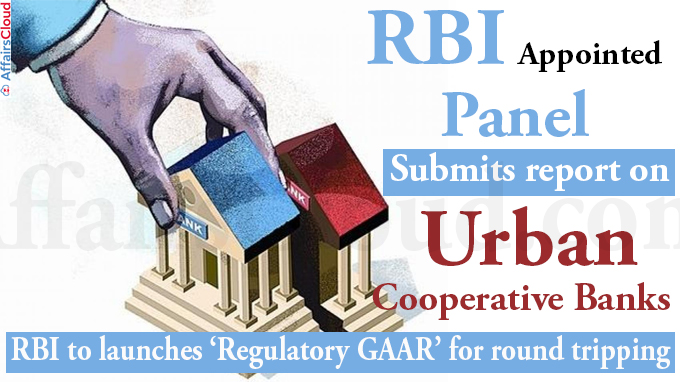 In August 2021, the Reserve Bank of India (RBI) released the recommendation report of the Expert Committee on Primary (Urban) Co-operative Banks (UCBs) under the chairmanship of N. S. Vishwanathan, which was constituted by RBI to review the issues of UCBs and to provide a road map for strengthening the sector.
In August 2021, the Reserve Bank of India (RBI) released the recommendation report of the Expert Committee on Primary (Urban) Co-operative Banks (UCBs) under the chairmanship of N. S. Vishwanathan, which was constituted by RBI to review the issues of UCBs and to provide a road map for strengthening the sector.
Background:
i.In February 2021, the RBI constituted an expert committee on UCBs under the chairmanship of N. S. Vishwanathan, former Deputy Governor, RBI, to suggest measures to enable faster rehabilitation/resolution of UCBs.
ii.The committee has also been directed to review the Regulatory provisions through the recent amendments to the Banking Regulation Act, 1949 (As Applicable to Cooperative Societies).
Recommendations of the committee over UCBs:
i.To ease the regulatory process, the committee has recommended a 4-tier structure for the UCBs, based on their capital availability and other factors.
ii.The 4 tier structure include
- Tier 1 – All unit UCBs and salary earner’s UCBs (irrespective of deposit size), and all other UCBs having deposits up to Rs 100 crore
- Tier 2 – UCBs with deposits between Rs 100 crore – Rs 1000 crore
- Tier 3 – UCBs with deposits between Rs 1000 crore – Rs 10,000 crore
- Tier 4 – UCBs with deposits more than Rs 10,000 crore
iii.The committee also suggested the setting up of an Umbrella Organization (UO) with a minimum capital of Rs 300 crore with Capital to Risk-Weighted Assets Ratio (CRAR) and regulatory framework similar to Non-Banking Financial Companies (NBFCs).
Regulatory Framework for different Tiers of UCBs:
i.Tier 1 banks having an area of operation within a district should have a minimum capital and reserves (net worth) of Rs 2 crore and other Tier 1 banks should have a minimum net worth of Rs 5 crore.
- The minimum requirement of CRAR for Tier-1 UCBs varies from 9-14 percent based on the membership with UO and net worth requirement.
ii.A Tier 3 UCB will be allowed to function on the lines of a Small Finance Banks (SFBs) if it meets both the entry point capital (Rs 200 crore) and the CRAR requirement (15 percent) that are applicable to SFBs.
iii.The Tier 4 UCBs will be allowed to function as a universal bank only if they meet the 9 percent capital adequacy ratio and Rs 500 crore of entry point capital requirement.
Other Key Recommendations:
i.The committee also suggested allowing UCBs to grant advances to subscribers of Perpetual Convertible Preference Shares (PCNPS).
- The number of such borrowers should not exceed 20 percent of the total borrowing members of the UCB.
ii.It recommended the inclusion of twin indicators viz, CRAR and Net NPA (Non-Performing Assets) under the Supervisory Action Framework (SAF) to reducing the time spent by a UCB under SAF.
iii.The committee also recommended opening licensing of new UCBs (Currently, 1500 UCBs exist) and also allowing the existing UCBs to expand their footprint. The number of borrowers of UCBs was estimated at 67 lakhs. Click here to know more
RBI Plans to Include GAAR Regulations for Round-Tripping
RBI has made changes in the existing regulation of foreign investment and released the draft rule to discourage round-tripping.
- As per the draft, the investment made in an entity outside India, which in turn invests in India to avoid tax will be treated as ‘round-tripping’.
- This regulation is similar to General Anti-Avoidance Rule (GAAR), which is an anti-tax avoidance law in India to curb tax evasion and avoid tax leaks.
- GAAR came into effect on 1st April 2017 and its provisions come under the Income Tax Act, 1961.
Recent Related News:
In July 2021, The RBI issued directions relating to ‘Appointment of Managing Director (MD) / Whole-Time Director (WTD)’ in all Primary (Urban) Co-operative Banks (UCBs).
About Reserve Bank of India (RBI):
Establishment – 1st April 1935
Headquarters – Mumbai, Maharashtra
Governor – Shaktikanta Das
Deputy Governors – Mahesh Kumar Jain, Michael Debabrata Patra, and M Rajeshwar Rao, T. Rabi Sankar




